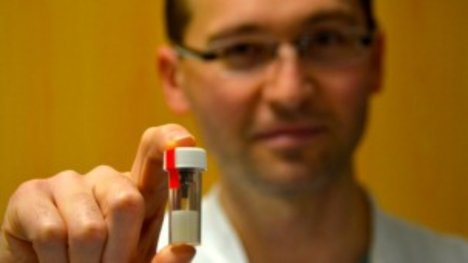Israeli dental implant is being tested in Saxony-Anhalt

Science and economy go hand in hand.
Israeli company DenTack Implants (Ltd.) and the Martin-Luther University are working together: In summer 2014, a research cooperation was agreed between the manufacturer of dental implants based near Tel Aviv and the University Hospital for Oral and Maxillofacial Surgery. The Investment and Marketing Corporation Saxony-Anhalt - The Economic Development Agency of the German Federal State of Saxony-Anhalt (IMG) established the contact as part of its overseas acquisition activities. An innovative implant system made in Israel is now being tested in Halle/Saale. – With advantages for both sides. Report INVEST spoke to the oral and maxillo-facial surgery specialist, Dr Waldemar Reich, who offers a special clinic for implantology at the University of Halle and is conducting the study.
Implants have been an established method of treatment in dental medicine since the 1980s. What is this dental prosthesis like?
Reich: Conventional implants are made from titanium, have the form of a screw and are at least 8 to 10 millimetres long depending on the manufacturer. They can be implanted in the jaw if other dental prostheses, such as crowns, bridges or dentures, are no longer possible. This creates an artificial tooth root. Dental implants can then be attached to this, normally after a healing period, the length of which depends on the bone strength. This method is tried-and-tested and can be used for patients after an accident as well as for old aged citizens, who no longer have any natural teeth or for patients who have had oral cancer. However, there is a problem: If the loss of teeth was a long time ago, the osseous tissue in the jaw is reduced in size. As a result, the 8 to 10 millimetres needed for implantation are often no longer available. To help these patients, osseous tissue from other parts of the body have to be transplanted into the jaw. This can be very complex and difficult for the patient. This begs the question of whether there are alternatives for this standard treatment. One such alternative could be shorter implants, such as those manufactured by DenTack. They offer a short implant with a special feature.
What is the special feature?
Reich: The product from Israel is expandable, which is why we are also very interested in it. This means: during use, it is expanded in the jaw (rather like an expansion plug). This opening up increases the contact surface to the bone and creates considerable relief for the tissue with functional loads at the entry point to the bone. The latter is important for long-term success. And despite its limited length of about 7 millimetres, it provides the necessary stability. DenTack has already been able to prove this as part of in-vitro studies.
So is the new system already licensed?
Reich: Yes. But there are not yet any long-term experiences with it. This is why clinical tests are needed. For this reason, the vice-president of the Israeli start-up Oz Vachtenberg, came to Halle/Saale in the summer to introduce the implant system in our clinic. Then we agreed to the study. We want to test the success rates and investigate what is known as the “oral health related quality of life” of the patients. Ultimately, the length of the implant is completely unimportant to the patient. It only matters to the patient how well they can eat, chew and speak with a dental prosthesis that has been attached to an implant.
How does such a study work and what happens to the results?
Reich: At the beginning, we developed a solid concept and obtained the necessary vote from the ethics commission. In July 2014, the new system was implanted into the first patient. A representative of DenTack was also present at this operation. The aim of the clinical study is now to incorporate as many patients into the study in order to have implanted 100 implant systems. The study participants are observed prospectively. This means: As well as the medical examination, internationally standardised questionnaires are answered at various points before and after the intervention. In addition, we measure the stability of the implant when it is fitted and before the dental prosthesis is attached. We expect the results to provide information about the stability and life quality of patients together with a prognosis about the durability, i.e. the treatment success with this method.
What are the advantages of such a cooperation?
Reich: As a University hospital, we are generally interested in new research results. Our aim is to practice solid science and publish the results in a renowned journal. But there is also something in it for DenTack. For a small start-up business, a clinical study means reputation. In addition, our results can help to optimise the system. If such a system or a similar one is proven, it will essentially help patients because the bone transplantations that have been used to date will not be required for certain patients, meaning less interventions per patient. In turn, this is also expected to reduce the treatment costs for clinics and hospitals. This makes it a win-win situation.
Author: Ines Godazgar on behalf of Investment and Marketing Corporation Saxony-Anhalt
Contact:
Dr. Waldemar Reich
University Hospital and Polyclinic for Oral and Maxillofacial Surgery
Ernst-Grube-Straße 40
Halle/ Saale
Tel: +49 (0)345/557-5244
Email: waldemar.reich@medizin.uni-halle.de
